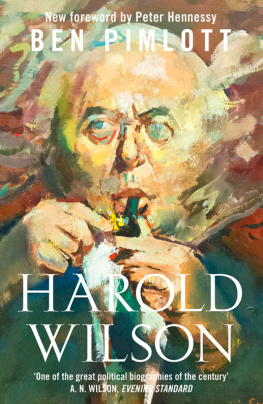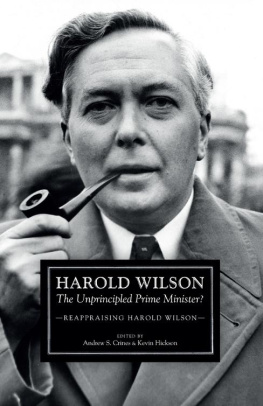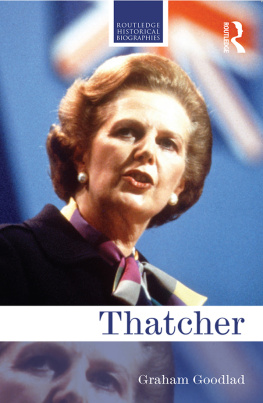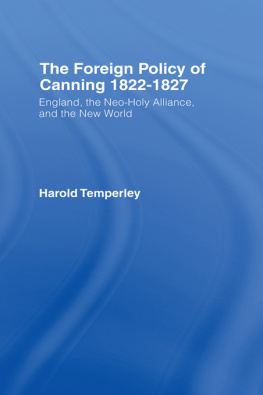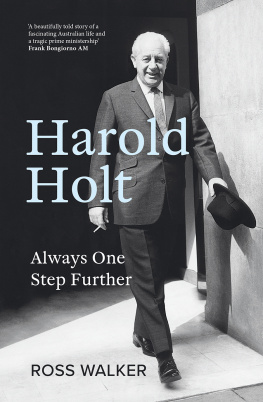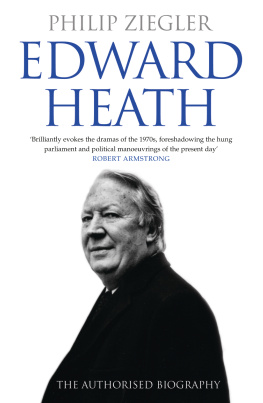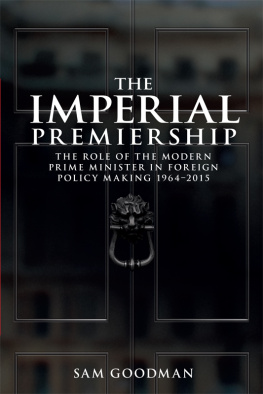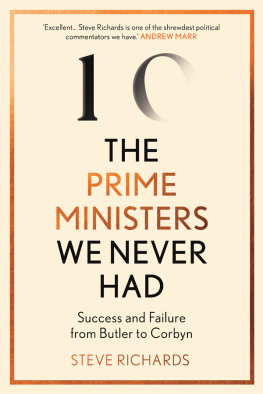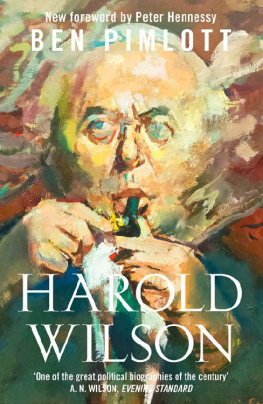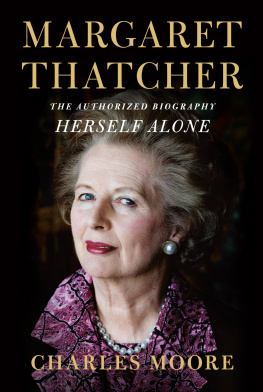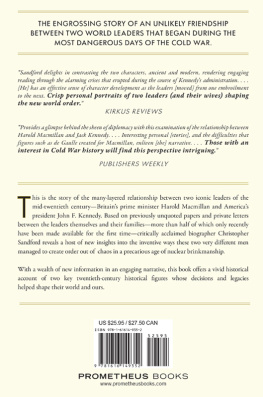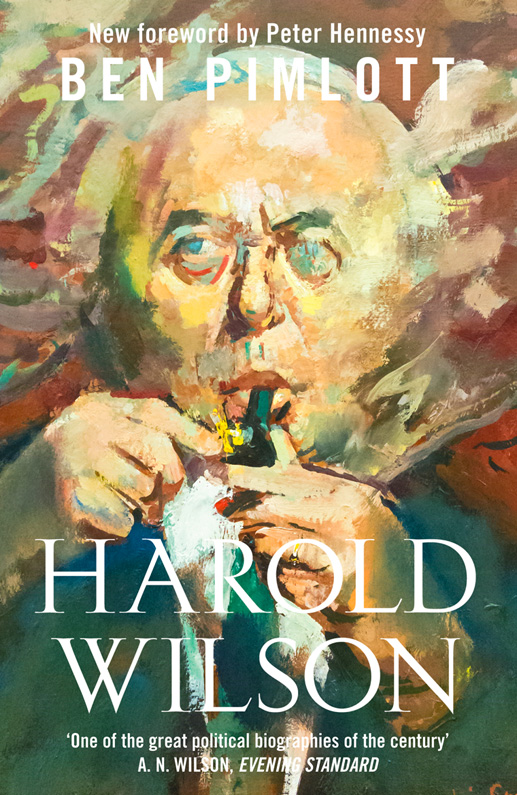
Ben Pimlott was the Warden of Goldsmiths College, London. Previously he had been Professor of Politics and Contemporary History at Birkbeck College. His first book was published when he was sixteen. He was the author of Labour and the Left in the 1930s (1977), Hugh Dalton (1985), which won the Whitbread Prize for Biography, Harold Wilson (1992) and Frustrate Their Knavish Tricks (1994). He edited Hugh Daltons War and Political Diaries (1981, 1984) and edited numerous other books including Fabian Essays in Socialist Thought (1984), The Alternative (1992), and, together with Jean Seaton, Politics and the Media in Britain (1990) and Harlots and Prerogatives (2001). He wrote introductions to George Orwells work, was political columnist for The Times, the New Statesman and the Sunday Times, and wrote for the Independent on Sunday, the Guardian, the Observer and the Daily Mail, as well as broadcasting regularly. He launched and edited the magazine Samizdat, stood for Parliament (unsuccessfully), was Chair of the Fabian Society and active in Labour politics. He was described by Andrew Marr as the best British political biographer now writing. Ben died in 2004 at the age of fifty-eight.
BEN PIMLOTT
Harold Wilson

FOR
DANIEL, NATHANIEL AND SETH
Contents
In the old days, writing the life of a public figure was frequently part of a process of canonization. Only after the subject was respectably dead would it be attempted, and then by arrangement between the executors and a suitable admirer, with the implicit purpose of enhancing the reputation of the deceased. A customary part of the ritual was for the author to declare at the beginning of the book that the co-operation of the family had been provided unconditionally, and that no pressure had been exerted whatsoever. Such a work was known as the official or authorized biography.
This book is neither official nor authorized, but it would be untrue to say that I have not been under any pressure while writing it. Pressure from Lord Wilsons former supporters and opponents in politics, from Whitehall and Fleet Street confidants and critics, and from his personal friends and enemies has been unremitting. At the same time, it has always been courteous, usually charming and often unless I was very careful beguiling. Indeed, as a way of getting to know and understand my subject, it has been invaluable, as much for the appreciation of the feelings which he and the politics of his time aroused, as for the details of the arguments that were put to me.
I have a great many debts. The first is to the Wilsons who have been unfailingly kind and helpful. In particular, I have greatly benefited from conversations with Lord and Lady Wilson, and Robin Wilson. I am also most grateful to them for family papers, photographs and other documents.
Several people have helped with the research. I would especially like to thank Anne Baker, who investigated a number of collections of private papers on my behalf with the greatest sensitivity and professional skill. I am also grateful to Andrew Thomas, who conducted interviews in Huddersfield and Huyton, and Gerard Daly, who examined Labour Party papers at the Labour Museum in Manchester. Among the many archivists and librarians who responded to my queries and were generous with their time, I should like to thank, in particular, Stephen Bird, formerly at the Labour Party Library in Walworth Road and now at the National Museum of Labour History; Dr Angela Raspin, at the British Library of Political and Economic Science; Helen Langley, at the Bodleian Library, Oxford; Christine Woodland, at the Modern Records Centre at Warwick University; Dr Correlli Barnett at Churchill College, Cambridge; Caroline Dalton at New College, D.A. Rees at Jesus College and Christine Ritchie at University College, Oxford; and Ruth Winstone, editor of the Tony Benn Diaries. I am grateful to the large number of people who helped me by correspondence or on the telephone. For sending me documentary material, I should like to thank Michael Crick, Francis Wheen, Sir Alec Cairncross, Lord Young of Dartington, Lord Jay, David Edgerton, Mervyn Jones and Ron Hayward. I am most grateful to Lord Jenkins for allowing me to see a manuscript copy of his autobiography, before it was published, and to Tony Benn, for letting me rummage around in his basement archive.
I am grateful to the following for permission to quote copyright material: Jonathan Cape (B. Pimlott (ed.), The Political Diary of Hugh Dalton; P.M. Williams (ed.), The Diary of Hugh Gaitskell), Hamish Hamilton Ltd (J. Morgan (ed.), The Diaries of a Cabinet Minister, 3 Vols.; Richard Crossman, The Backbench Diaries of Richard Crossman), David Higham Associates (Barbara Castle, The Castle Diaries, 2 Vols.), Hutchinson (Mary Wilson, New Poems; Tony Benn, Diaries), Michael Joseph (H. Wilson, Purpose in Politics, and Memoirs: the Making of a Prime Minister), Macmillan Publishers Ltd (Roy Jenkins, A Life at the Centre), and Manchester University Press (M. Dupree (ed.), Lancashire and Whitehall: The Diary of Raymond Streat). For the use of unpublished papers and documents I am grateful to Harold Ainley (Ainley papers), Tony Benn (Tony Benn papers), Bodleian Library (Attlee papers, Lord George-Brown papers, Goodhart papers, and Anthony Greenwood papers), British Library of Political and Economic Science (Beveridge papers, Dalton papers, and Shinwell papers), Lord Cledwyn (Cledwyn papers), John Cousins (Frank Cousins papers), Susan Crosland (Crosland papers), Anne Crossman (Crossman papers), Livia Gollancz (Victor Gollancz papers), the Gordon Walker family (Gordon-Walker papers), Lady Greenwood (Anthony Greenwood papers), Lord and Lady Kennet (Kennet papers), Labour Party Library (Labour Party archives), Modern Records Centre, University of Warwick (Maurice Edelman papers and Clive Jenkins papers), the Warden and Fellows of Nuffield College, Oxford (Cole papers, Fabian Society papers and Herbert Morrison papers), Hon. Francis Noel-Baker (Noel-Baker papers), National Museum of Labour History, Manchester (Parliamentary Labour Party papers), Frieda Warman-Brown (Lord George-Brown papers), Ben Whitaker (Ben Whitaker papers), the Wilson family (Wilson family papers).
I am extremely grateful to the following people, who have talked to me in connection with this book: Harold Ainley, Lord Armstrong of Ilminster, Tony Benn, Sir Kenneth Berrill, H.A.R. Binney, Lord Bottomley, Professor Arthur Brown, Sir Max Brown, Sir Alec Cairncross, Lord Callaghan, Bridget Cash, Baroness Castle, Lord Cledwyn, Brian Connell, John Cousins, Lord Cudlipp, Tam Dalyell, Lord Donoughue, Baroness Falkender, Peggy Field, Michael Foot, Paul Foot, John Freeman, Lord Glenamara, Geoffrey Goodman, Lord Goodman, Joe Haines, Lord Harris of Greenwich, the late Dame Judith Hart, Roy Hattersley, Ron Hayward, Lord Healey, Janet Hewlett-Davies, Lord Houghton, Lord Hunt of Tamworth, Henry James, Lord Jay, Lord Jenkins of Hillhead, the late Peter Jenkins, Jack Jones, Lady Kennet, Lord Kennet, Lord Kissin, David Leigh, Lord Lever, Sir Trevor Lloyd-Hughes, Lord Longford, Lord Lovell-Davies, David Marquand, Lord Marsh, Lord Mayhew, Lord Mellish, Ian Mikardo, Jane Mills, Sir Derek Mitchell, Sir John Morgan, Lord Murray, Sir Michael Palliser, Enoch Powell, Merlyn Rees, William Reid, Jo Richardson, George Ridley, Lord Rodgers, Andrew Roth, A.J. Ryan, Lord Scanlon, Lord Shawcross, Peter Shore, Professor Robert Steel, Sir Sigmund Sternburg, Sir Kenneth Stowe, Lord Thomson of Monifieth, Alan Watkins, Ben Whitaker, Sir Oliver Wright, Lord Wyatt of Weeford and Sir Philip Woodfield. I also interviewed a number of other people who prefer not to be named. Where it has not been possible to give the source of a quotation in the notes, I have used the words Confidential interview. I apologize for the frequency with which I have had to resort to this formula. Andrew Thomas interviewed Harold Ainley in Huddersfield, and Jim Keight, Ron Longworth and Phil MacCarthy in the North-West. I would like to thank them as well.

